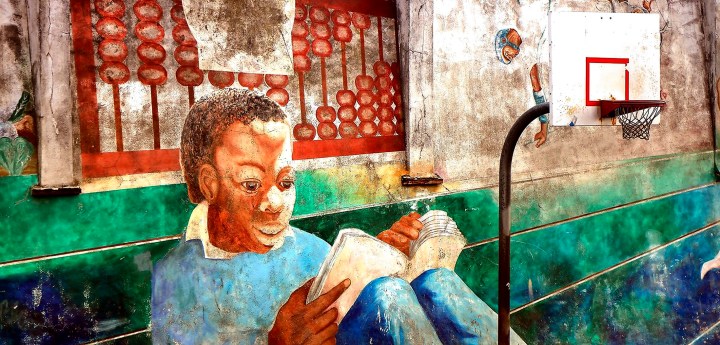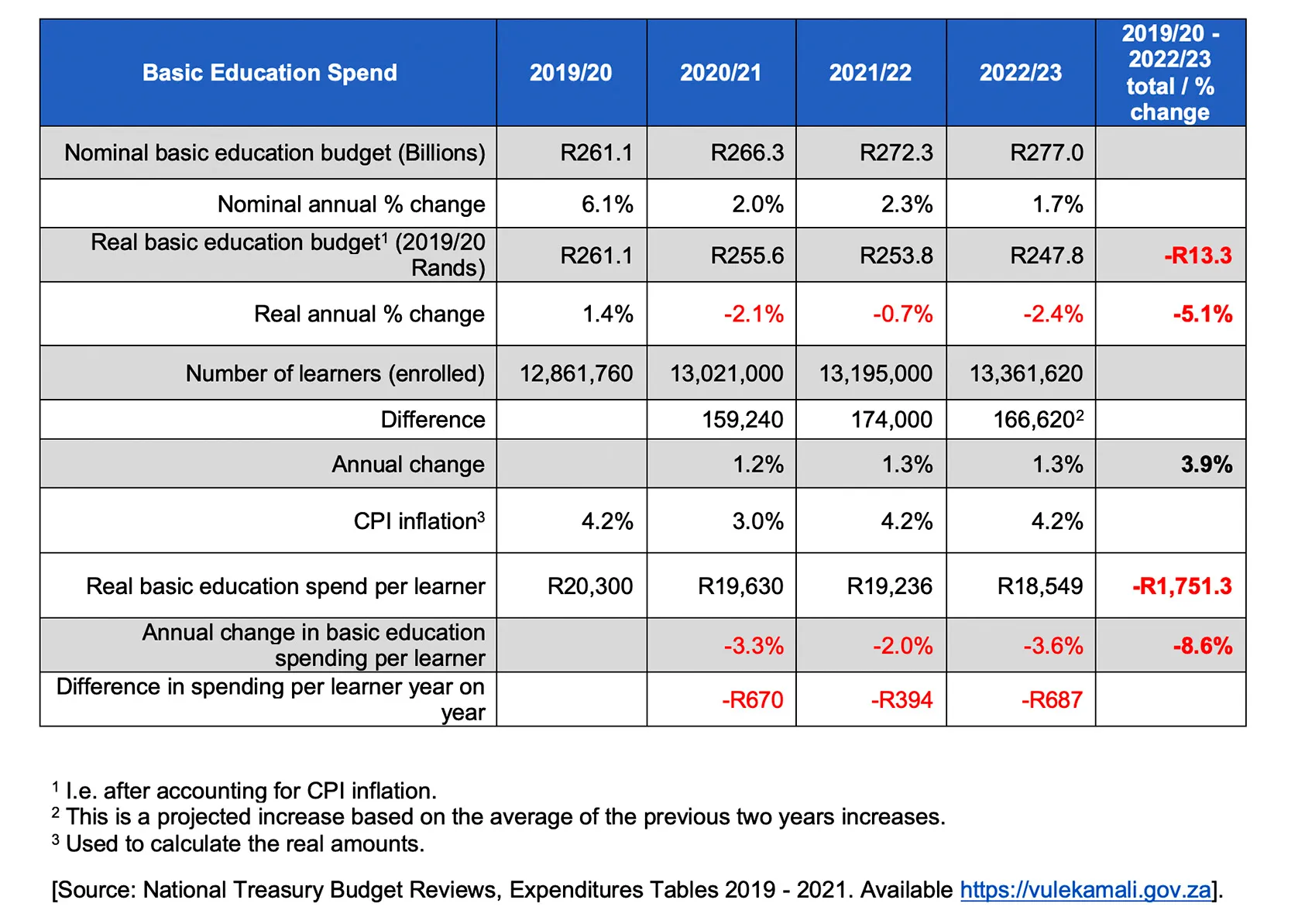MAVERICK CITIZEN #BUDGET2021 RESPONSES
A step backwards for learners’ rights to basic education

SECTION27 is very concerned that the Budget allocates less funding in real terms to basic education this year and for the next three years, to the detriment of the 13.2 million learners in South African schools.
Despite celebratory claims that this year’s Budget will improve our society for future generations, the National Budget tabled by Finance Minister Tito Mboweni on 24 February 2021 does not do justice to the needs of learners in the basic education system in this country, and may have serious repercussions for future generations. The Budget advances a trend of prioritising the reduction of public debt and keeping the wealthy happy, while failing to give adequate protection to socioeconomic rights like the right to basic education.
Some promises made in Mboweni’s Budget were hopeful, with some of the funds for education infrastructure that had been slashed last year recovered. However, SECTION27 is very concerned that the Budget allocates less funding in real terms to basic education this year and for the next three years, to the detriment of the 13.2 million learners in South African schools.
As noted by the UN Committee for Economic Social and Cultural Rights, the right to education is an “empowerment right”, which allows individuals to enjoy other rights and participate meaningfully in society. Within the South African context, the significant transformative potential of this right has been acknowledged through its inclusion in the Bill of Rights, and must be realised to ensure that every learner can enjoy the benefits of a basic education. This Budget risks entrenching unequal access to quality education, which will not only hamper the realisation of the right to basic education, but in turn reproduce other social and economic inequalities.
Basic education funding on a downward spiral with no end in sight
The 2021 National Budget continues and accelerates a downward trend in basic education funding which SECTION27 has documented, along with our partners in the education sector, in recent years.
Table 1

Table 1 shows that while consolidated spending on basic education will grow slightly in nominal terms until 2023, the increases are far below annual CPI inflation of between 3% to 4% for this period. This means that the real value of education spending is in fact declining. In real terms (when CPI inflation is accounted for), the government’s spending on basic education decreases by -0.7% in 2021/22 and by a further -2.4% in 2022/23. This amounts to real cuts of R1.8-billion in 2021/22 and R6-billion in 2022/23.
This real-terms reduction in funding for basic education is especially problematic, given that the number of children enrolled in the public education system is increasing at more than 160,000 learners per year. As a result of these two competing trends (reduction in education funding and an increase in learner numbers), real spending per child is declining significantly year after year.
Table 1 shows that the government was spending R20,300 per learner on basic education in 2019/20. If learner numbers continue to increase by a similar amount in 2022/23 as they did in the previous two years, the austerity budgeting reduces this amount to R18,549. This means that the government plans to spend R1,751 less per child enrolled in public schools in 2022/23 compared to 2019/20.
In a brazen admission of its neglect of the rights of learners to a quality basic education, the Treasury concedes that limitations in allocations to the sector will result in poor learning outcomes. It says:
“Low compensation growth of 0.8 per cent over the MTEF period, combined with early retirements, will reduce the number of available teachers. This, coupled with a rising number of learners, implies larger class sizes, especially in no-fee schools, which is expected to negatively affect learning outcomes (2021 Budget Review, p.59).”
In addition to squeezing the wages and numbers of public school teachers, the 2021 Budget goes further and announces cuts of R250-million to the Funza Lushaka Bursary, which enables new teachers to replace older teachers who have been offered early retirement packages.
In total, Cabinet has approved R1.6-billion worth of cuts to previously planned spending in the sector over the medium term. This decrease also comprises the reduction of transfers to provincial education departments and a number of conditional grants to the sector.
Notably, the HIV and AIDS (life skills education) conditional grant, which is used to fund comprehensive sexuality education (CSE) in schools, has been cut by R61.4-million over the medium term, representing a reduction equal to 8.9% by 2023/2024. The cuts to CSE, which are likely to result in fewer teachers trained or materials distributed to support the programme, may delay the realisation of adolescent sexual and reproductive health rights goals. Strong evidence proves that well-resourced CSE leads to safer sexual behaviours in young people. For this reason, CSE cannot be a dispensable component of the South African school curriculum, and its sidelining in this Budget is deeply concerning for South Africa’s objective to combat the spread of HIV.
That the National School Nutrition Programme (NSNP) conditional grant is set to increase at 5% annually over the next three years and has not been subject to fiscal consolidation is to be welcomed, particularly after the judgment ordering the DBE and provinces to provide school meals to all eligible learners despite the Covid-19 lockdown. Meal costs per primary school learner will increase at a minimum of 5% and 3% for all secondary schools, where for the past four years, school meal prices increased at 4% and 2% for primary school learners and secondary school learners respectively. Whether this year’s increases keep up with food price inflation, or account for increased enrolment in schools, is not clear in the Budget, however.
In a move now characteristic of the finance minister’s disregard for the most vulnerable groups in society, reductions made to the NSNP grant worth R22.4-million in the medium term will cut compensation for the voluntary food handlers who prepare and distribute school meals. The small stipend that food handlers receive is often their main source of income. This is but one example of how the penny-wise austerity budgeting of the National Treasury is punishing the least well-off in our society. The rights of people informally or precariously employed, like voluntary food handlers, must be upheld.
In a period where Covid-19 has made the need for safe and hygienic school infrastructure so evident, SECTION27 welcomes the partial recovery of funds directed towards fixing school infrastructure, including unsafe sanitation. R36.7-billion has been allocated towards the Education Infrastructure Grant (EIG) over the medium-term period, with an allocation of R11.6-billion for this financial year. After R2.2-billion was abruptly removed from the EIG in 2020’s Supplementary Budget, and a further R4.4-billion reprioritised within the grant to cover Covid-related expenses in schools, we welcome the renewed funding commitment to this essential grant.
The suspension of EIG funds in 2020 led to the postponement or scrapping of 1,938 school infrastructure projects. It’s unclear whether the increases to the EIG this year will allow the Department of Basic Education not only to resume and meet last year’s school infrastructure targets, but also to achieve school maintenance and building projects for this year and beyond. Cuts amounting to R413.3-million to the school infrastructure backlogs grant (SIBG) risk the persistence of unsafe school infrastructure like pit toilets in schools across the country.
This cut is confusing particularly because this grant funds the Accelerated School Infrastructure Delivery Initiative (ASIDI), through which the DBE plans to provide 1,000 schools with sanitation this year – a target that far exceeds previous years’ goals. This target is also doubtful because of the DBE’s extremely poor track record with respect to meeting infrastructure delivery deadlines.
So, while the recovery of some funds to education infrastructure grants which were slashed as the sector was considered a “donor” to the Covid-19 relief effort last year, is certainly a welcome step, in its totality, this Budget represents a step backwards for the rights of learners to basic education. Despite Tito Mboweni’s desire not to be remembered as the Minister of Austerity, four years of cuts to per learner expenditure demonstrate that the evidence is not on his side. DM/MC
Daniel McLaren is a budget analyst; Julia Chaskalson is a communications officer; Demichelle Petherbridge is an attorney in the education rights programme. All three work at SECTION27.




















 Become an Insider
Become an Insider
Thank you for this. I am very disturbed by the statement from the Treasury, which you quote above. I have been grappling with the feeling that the worsening of class overcrowding seems to be accepted as a necessary evil. Over the 3-4 years that I’ve been involved with under-resourced schools, I’ve seen people resigning themselves to intolerable Teacher-to-Learner ratios. Even without mentioning the Covid-19 distancing requirements, how are we ever going to win any of the battles for the youth of this country if we don’t fight for decent class sizes?